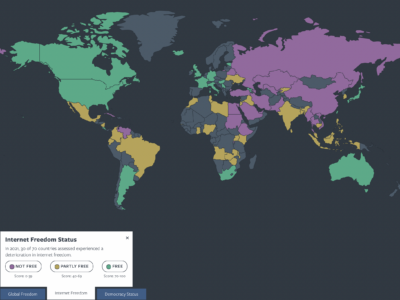This article by Global Voices’ Caucasus editor was originally published on 9 March 2011 by Transitions Online and is used by permission.
When Adnan Hajizade and Emin Milli, two video-blogging youth activists in Azerbaijan, were detained on 8 July 2009 on what many believe were trumped-up charges, supporters and friends naturally used Facebook to campaign for their release. However, spreading networks wide in order to disseminate information and updates, there were obviously risks involved. Reports of the security services monitoring Facebook were coming out of neighboring Iran, and there was no reason to think it couldn’t happen in Azerbaijan.
For the two young men’s supporters, however, that didn't matter. What was arguably more important was that Facebook was crucial in the campaign to free them. And, as international awareness of the plight of Hajizade and Milli increased before their release in last November, they were probably right. Despite the inherent risks, spreading information quickly and efficiently is one thing that Facebook and Twitter are good at. However, with the use of such tools once again in the spotlight following this year’s popular uprisings in Egypt and Tunisia, the debate over persisting personal and security concerns has re-emerged.
In particular, in a recent interview with Radio Free Europe, Evgeny Morozov, author of The Net Delusion: The Dark Side of Internet Freedom, started the ball rolling by saying that internal security agencies might actually welcome the use of new- and social-media tools. “The reason why the KGB wants you to join Facebook is because it allows them to learn more about you from afar,” he said. “It allows them to identify certain social graphs and social connections between activists. Many of these relationships are now self-disclosed by activists by joining various groups.”
In Azerbaijan that is certainly proving to be the case. On 5 February, Jabbar Savalan, a 20-year-old activist from the opposition Popular Front, was arrested and charged with narcotics possession, something his supporters and lawyer strongly deny. Instead, they claim, Savalan was detained for comments made on Facebook a day earlier calling for Egypt-style protests in the country. Amnesty International has also denounced the charges, calling them a “pretext to punish Jabbar Savalan for his political activism and to discourage other youth activists from exercising their right to freedom of expression.”
The international human rights organization also noted that Savalan was interrogated without a lawyer and alleges that he was pressured into signing a confession that he later retracted. Amnesty further demands that the authorities “justify Jabbar Salavan’s pretrial detention or release him immediately.”
A few days later, on 9 February, another Popular Front activist, Elchin Hasanov, was summoned by police and instructed to remove messages on his Facebook page calling for protest actions in Savalan's support, and last week Harvard-educated parliamentary candidate Bakhtiyar Hajiyev was arrested. Although the charges against him relate to avoiding military conscription, his supporters say that this was again simply an excuse, given his constitutional right to alternative service instead. Moreover, they allege, before his arrest Hajiyev was questioned about his activities on Facebook.
As well he might have been. Of seven moderators of a recently launched Facebook page calling for Egypt-style protests in Azerbaijan to take place on 11 March, Hajiyev is the only one who lives in the country. Indeed, in an interview with RFE’s Baku bureau days earlier, one of those other moderators said that had he opened the page while living in Azerbaijan he would probably have been arrested. A few days later, another activist, Dayanat Babayev, was detained by police for 10 days for what they say was “disrupting public order” while speaking loudly and inappropriately on a cell phone while walking. At least one witness, however, claims that Babayev was instead forcibly removed from an Internet café.
Yet, despite officials’ apparent concern about its power, Facebook penetration in Azerbaijan remains incredibly low, at just 324,880 users or 3.9 percent of the population. This pales in comparison with even neighboring Georgia, where 516,300 people, or 11 percent of the population, use the site. Nevertheless, the authorities in Baku appear to be taking no chances. In April 2010, for example, Zahid Oruj, a member of parliament’s security and defense committee, spoke out against Facebook by suggesting it could be used by foreign powers to “recruit agents.”
“It is possible that secret agents sit in social networks trying to lure people to cooperate,” he told journalists, suggesting that this perceived threat should be legislated against. “In my opinion, one cannot exclude that intelligence services of various countries can also lead Azerbaijani nationals to secret cooperation through social networks. We must not allow hostile forces to use different Internet services against us. In this matter, the danger comes not only from Armenian nationalists, but also other forces.”
A media campaign to discredit the use of Facebook followed and continues, especially after events in the Middle East and North Africa. On 1 March, for example, the online news site Qaynar.Info published the names of prominent opposition and alternative voices in Azerbaijan who had Armenian contacts and friends listed on their Facebook pages. Responses to the piece from youth activists in Azerbaijan were critical, viewing the article as a further attempt to highlight the site as an internal security threat and to portray those named as “enemies of the state.”
The following day, Rauf Mardiyev, secretary general of the IRELI Public Union, a youth organization considered by many activists to be pro-governmental and the local equivalent of the Russian Nashi, followed the same line. In a blog post titled, “The real face of 11 March,” Mardiyev highlighted the appearance of six Armenian names among the first 50 of 2,658 members signed up on the Facebook page set up by Hajiyev. Although the group was an open one, the post ended by stating that “no other comments are necessary,” with Mardiyev saying he would instead “leave it up to the conscience of readers.”
With public hostility toward Armenians high in Azerbaijan because of the festering conflict over the disputed territory of Nagorno-Karabakh, playing this card has become predictable in recent years. A household survey in 2009 by the Caucasus Resource Research Centers, for example, found that 97 percent of Azerbaijanis were against friendship with Armenians. Even so, Facebook has proved invaluable in cross-border communication in lieu of traditional means in recent years, but others have already raised concerns about how this could be used against them.
“[One activist] said if pictures of Azerbaijanis together with Armenians are found on the Internet, then they will have to go to the KGB and be questioned,” a German journalist recently wrote to this author after she visited Baku late last year.
Meanwhile, the campaign against Facebook and Twitter has even made it into the broadcast media. Last month, for example, ANS TV ran a 12-minute news item on the “dangers” of Facebook and Twitter. Although starting out neutrally enough by describing how social media can spread information worldwide, it then cut to footage of U.S. Secretary of State Hillary Clinton speaking about net freedom before alleging that social-media tools were “dangerous” in Azerbaijan because they damage the morale of young people and could be exploited by “foreign enemies.”
To a lesser extent, following the uprisings in Egypt and Tunisia the same approach has been evident in Armenia. With the opposition staging a rally to mark the third anniversary of the 1 March post-election unrest in Yerevan that left 10 people dead, the Armenian National Congress, led by former President Levon Ter-Petrossian, tried to attract international attention to its cause by declaring that it, too, would stage a “Facebook revolution.” What’s more, the congress’ coordinator, Levon Zurabyan, claimed that most of the 132,000 Facebook users in the country supported the call.
Pro-government and nationalist bloggers, now referred to by the local media as “information security experts,” were quick to cast doubt on such claims by again alleging that social-media-induced revolutions were being promoted by the United States while others noted that in any case Zurabyan didn’t even use the site, so had no basis to make such claims. Besides, there had been very little activity noticeable on Facebook, with just 380 people both inside and outside Armenia signing up for the protest page. But that did not necessarily mean few would attend the rally: estimates of the turnout range between 10,000 and 50,000.
Nevertheless, it’s clear that activists’ use of social media played no role in the success of that rally, especially when compared with their more Internet-savvy counterparts in Azerbaijan. But even there, despite increased online activity, some remain unconvinced.
The protests planned for 11 and 12 March in Azerbaijan, where social media are being used extensively by activists, and another in Armenia on 17 March, where they are not, might help to further illuminate the bane-or-boon argument about these tools. Already senior members of the IRELI Public Union are attempting to support the authorities in Baku by countering information from activists in Azerbaijan on Facebook and Twitter ahead of the planned protests, and on 7 March they launched a new project to establish a network of young bloggers.
Meanwhile, as of the time of writing, Facebook is also inaccessible from Azerbaijani cellular phone operator Bakcell for the coming week for, it says, “technical reasons.” In an update on Twitter, IRELI’s Mardiyev denied this, but the decision was later confirmed by Bakcell’s customer service department. (Addition: Facebook is apparently accessible again via Bakcell)
Onnik Krikorian is the Caucasus editor for Global Voices Online and a freelance journalist and photographer in Yerevan.




12 comments